When morning came, I thought carefully about the plan from the previous night and decided it made sense–leave Tashkent that evening to explore Samarkand and Bukhara, and eventually come back to catch a connection to Baku. Leaving so soon meant I wouldn’t have time to visit nearby villages to meet ethnic Koreans today, but that could probably happen on the day I came back to Tashkent.
The first thing I wanted to check was whether there was a seat on a train to Samarkand in the late evening. I wanted to sleep on the train and arrive in Samarkand the following morning. I could save some money on accommodation, a strategy that I had also used in Xi’an and Urumqi. All the tickets at convenient times were sold out online, so I was going to try my luck at Tashkent South railway station in person. Hoping to catch any remaining tickets, I had to skip breakfast. I turned again to my bag of Uyghur bread, which was all I had eaten since leaving Suiun’s house the morning before. I finished the last piece of bread I was saving for breakfast. That humble meal marked the end of James’ Uyghur bread. It had traveled hundreds of kilometers across two borders through China, Kyrgyzstan, and into Uzbekistan, serving as my only food during difficult times.
Before going to the station, I needed to get an Internet connection, because my phone’s roaming didn’t work in Uzbekistan. I asked passersby on the sunny streets of Tashkent where I could get a SIM card and ended up in a big neighborhood shopping mall. It was still early and everything was closed, so I went over to a security guard and asked where I could buy a SIM card. Noticing my accented Russian, the security guard replied to me in fluent Korean, which surprised me. He apparently knew the language because he had lived in South Korea for about five years. Since the mobile store was going to open in about ten minutes, we stood around and had a little chat. When I told him about how I had ended up in Tashkent, he said, “Vam nado poyekhat’ v Shahrisabz” (“You should go to Shahrisabz”). He added, “Tam krasivo” (“It’s beautiful there”). That sounded appealing, but sadly I knew I wouldn’t have time. Still hungry and a little unwell, I didn’t have the energy to explain that I had only fourteen days left to reach Dublin, so I just politely said, “Ya budu” (“I’ll go”). Soon, the mobile store opened, and I got a SIM card. The security guard gave me his contact information and told me to call him anytime if I got lost.
After getting the SIM card, I ordered a Yandex taxi and rushed to the Tashkent South railway station. But the station staff could only tell me what I already knew: all the trains I wanted were sold out. The only available train to Samarkand that night was leaving at 8:00PM and would arrive in Samarkand at 1:00AM. It was awkward timing, but I figured I’d sleep at Samarkand station until sunrise. I booked the ticket straight away. As for the other tickets for the remaining part of the trip to Baku, I decided to defer the purchase a little longer while I explored Tashkent. It was already eleven o’clock, and I wasn’t going to spend the entire day planning.
I walked outside the station building into the overcast, cool autumn day and started heading to the old town. My first destination there was Chorsu Bazaar, a traditional marketplace under a giant Soviet-era dome building. Transport in Tashkent was pretty affordable. A bus trip to Chilonzor station cost me 1700 sum ($0.2), and a subway transfer to Chorsu was 2000 sum ($0.23). On my way, I realized that my cold symptoms were really acting up. My throat was very sore, and I was desperate to keep it under control. What I needed was some food and a good rest, but resting was not an option. I grabbed some fast food near a subway station, my first real meal since breakfast at Suiun’s.
The Soviet-built subway stations of Tashkent looked rather impressive. It was bewildering to discover such imposing remnants of the Soviet past in an ordinary neighborhood subway station. As I walked onto the platform of Chilonzor station, commanding chandeliers hung from the arched ceiling that swept down to sidewalls decorated with mosaics and statues. What had driven the Soviets to go to such lengths? As I admired the monumental structures so casually situated in the most unexpected place, a subway train made its dramatic entrance with a loud, echoing whine. The aging subway cars, brightly painted in sky-blue, were the same type that I had seen in Eastern Europe years ago. The relics of the Red Empire were still at work in this part of the world, too. Behind the Iron Curtain, citizens must have carried on with their everyday lives and struggles on these very platforms and in those very subway cars. Local passengers glanced at me with amusement as I took pictures of the subway cars and the stations.
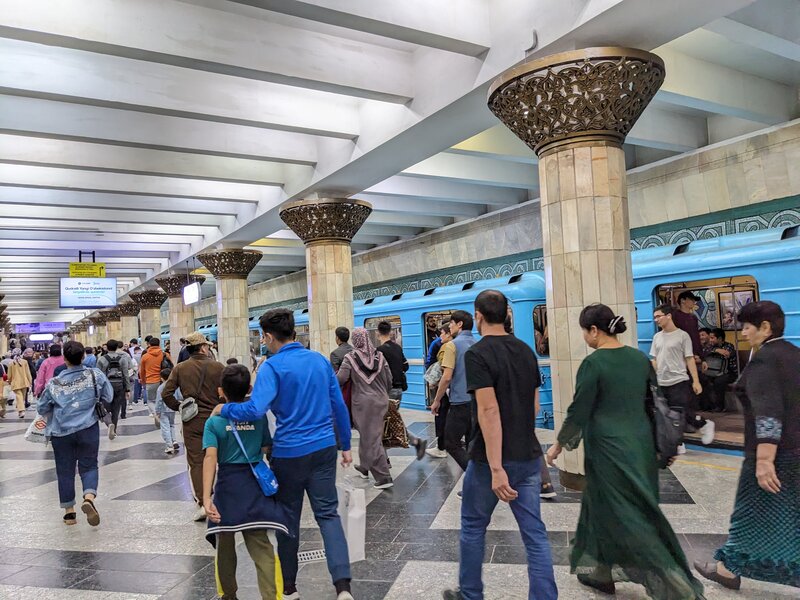
The relics of the red empire were still alive below the ground of Tashkent, the same way they were in other former USSR countries.
I walked out of the even more impressive Chorsu station and was immediately surrounded by the ruckus of the street market. The pathways were narrow and filled with pedestrians shopping for food or household items. I couldn’t see beyond the narrow streets and wasn’t sure where the bazaar was. In search of any dome-like structure, I walked through the meandering pathways with my large backpack while trying my best not to bump into anyone. I walked up some stairs and the passages became wider and the stalls became more organized. It seemed like I was getting close to the main part.
As I passed by hundreds of fruit stands, it dawned on me that my diet on this trip so far had been incredibly unhealthy. I had lived off pieces of bread or instant noodles for multiple days, and hadn’t had any fruit since leaving home. That couldn’t be good, especially now that I had these oncoming symptoms of a cold. Figuring I could use some vitamins or whatever good stuff fruits had, I bought two mandarins. But having barely bought any fruit back home, I managed to pick the rotten ones, a fact I only discovered after peeling them. The shopkeeper waved me off as I tried to exchange them for another one. As I looked for a bin to throw away the mandarins, a large dome suddenly came into view in the distance. I had accidentally arrived at Chorsu Bazaar.
Everything about that enormous dome structure screamed a strange amalgam of the Soviet Union and Central Asia. First of all, it wouldn’t be a Soviet building without mosaics, and this building had no shortage of them–the entire dome was covered with a mosaic in blue and teal colors. The mosaic, fading from its old age, was gleaming helplessly under the overcast sky. Its colors and the patterns looked just like something out of pictures of Islamic buildings in the region, as did the curved supporting arches. The entire thing was essentially just a giant roof designed to cover a large open area. There were no bells and whistles–the ultimate triumph of function over form. Under the gray sky, this aging structure had a certain air of antiquity that suggested to me that, if I stepped inside, I would be magically transported into some distant past.
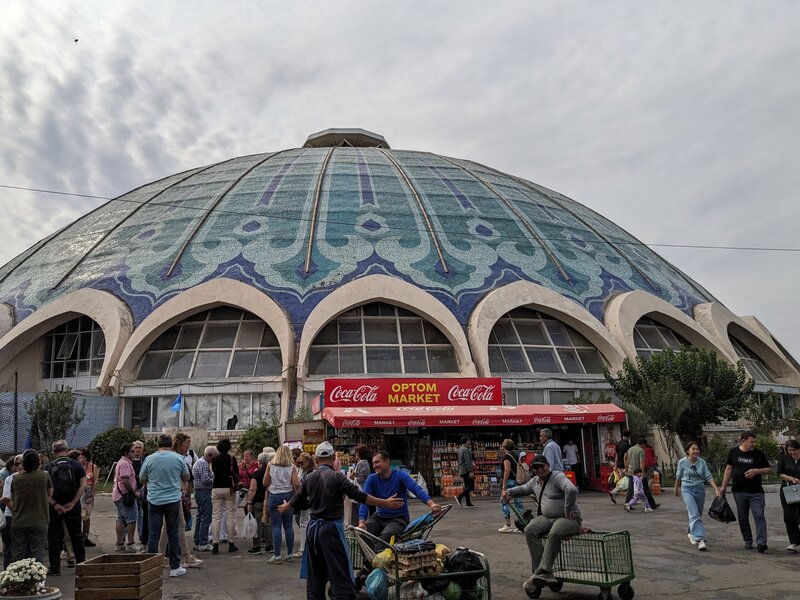
The aging Soviet-era mosaic covering the dome gleamed helplessly under an overcast sky.
Inside Chorsu Bazaar, the market was in full motion, and the unintelligible clamor of thousands of people echoed under the steel interior of the dome. There was order in the disorder here. Shops were arranged in circles, forming many different rings around the center of the dome, and were divided into sections just as a local supermarket would be divided into aisles. I carefully merged into the foot traffic of the busy circular paths and started walking around the circles. Carts were hauling various foodstuffs everywhere, locals were buying dairy products and butchers were cutting fresh meat. Interesting, but there was one problem. I must have walked around those various circles multiple times, because there was no clear landmark that could tell me where I was. As I noticed the same shops over and over, I broke off and tried to head to the second-floor mezzanine that surrounded the main area.
As I was heading to the staircase, I noticed something familiar. A babushka was selling what looked like a fermented cabbage seasoned with chili powder. It was unmistakably kimchi, a traditional side dish from Korea. I waited until I got the attention of the busy babushka and asked, “A kak nazyvayetsya eto?”(“What is this called?”) And she casually answered, “Eto? Chimchi” (“That? Chimchi”). “Chimchi, oh,” shocked, I ended up exclaiming in English, “it’s the same.” Sensing my surprise, the babushka remarked, “Da, u nas tozhe Chimchi,” (“Yes, we have Chimchi here, too”) and continued as she was laying out freshly made pickles on the stall, “V kareyi tozhe chimchi nazyvayetsya” (“It’s called the same in Korea”). Judging by her calm replies, I most likely wasn’t the only surprised Korean tourist who had bugged her with the same kimchi question.
I was really curious to find out whether the kimchi tasted similar. When I asked how much it was, the babushka answered that it was 50,000 sum ($3.80) per kilogram. I wasn’t sure what I would do with a kilogram of kimchi. I didn’t even have an accommodation for that day, and I had to board the train at 8:00PM that night. So I tried to ask politely whether I could try a piece, and she said “Mozhno, mozhno” (“You can, you can”). I carefully picked up a piece of cabbage from the ladle that babushka held out to me. When I bit into the crunchy piece of cabbage, a fresh and sour taste spread in my mouth. It was really kimchi, although it was less spicy than the Korean version. “Mm, pokhozheye!” (“Mm, similar!”) I exclaimed. “Pokhozheye, da?” (“Similar, right?”) said the babushka, being nice to this nosy tourist. I was delighted to find a Korean dish in this faraway land, but also couldn’t help but think about the history of their exile here and the hardships they must have endured. I thanked her and continued walking.
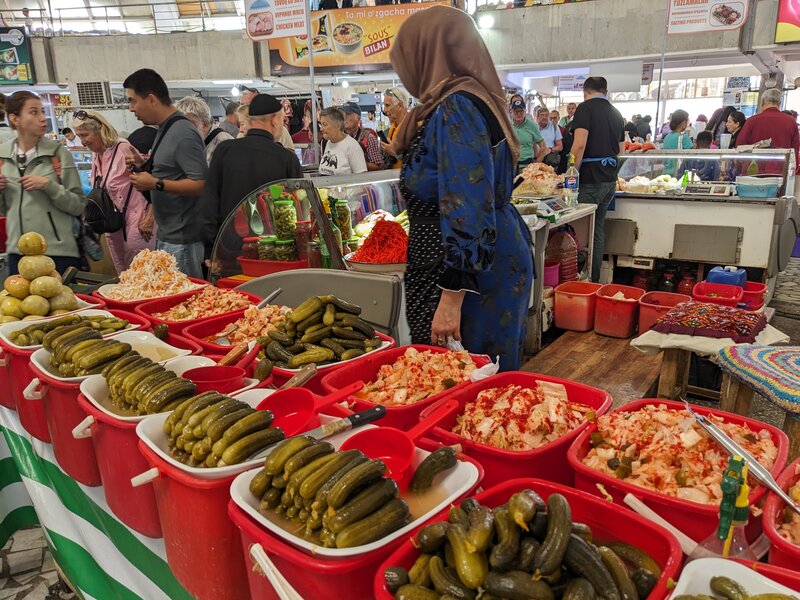
Discovering Korean kimchi in Tashkent was a delightful surprise, but also a saddening reminder of grim history that banished Koreans here.
As I walked up the stairs, a strong smell of spices greeted me before I reached the floor. Around the circular terrace that surrounded the entire main area, colorful piles of fine-grained spices were neatly laid out along with dried fruits and nuts. Sunlight that managed to get through the clouded sky was creeping into the bazaar through the old and opaque windows that surrounded the lower part of the dome. Away from the commotion of the main floor, the spice traders and their sun-drenched piles of spices were enjoying their moment of peace. As I walked through the terrace, the shopkeepers handed out some dried nuts and fruits for me to try. Chewing on the snacks and looking at all the vivid colors of spices, I wondered whether the traders of the olden times traded similar items when they passed through Tashkent–though I wasn’t sure. Centuries had passed, and the caravans had long been replaced with container boxes on trucks and ships. From the mezzanine of that Soviet-era building, it was hard to imagine a time that far into the past.
After the bazaar, I checked out some mosques nearby. After all, one of the reasons that I chose Uzbekistan as my final destination in Central Asia was to see the unique Islamic architecture with my own eyes. The mosques weren’t far and had styles similar to those in Kashgar or Osh. The only difference was that the mosques here were much bigger and much more glamorously decorated. For instance, the mosque that I saw in Kashgar was supposed to be the biggest mosque in China. But an ordinary mosque in Tashkent, just one of the many in the city, was easily several times bigger. The most distinct part was the oversized arched gate, which was something I hadn’t noticed in other countries. The imposing gates were decorated with ornate patterns and mosaics and appeared even more imposing when I looked up from below.
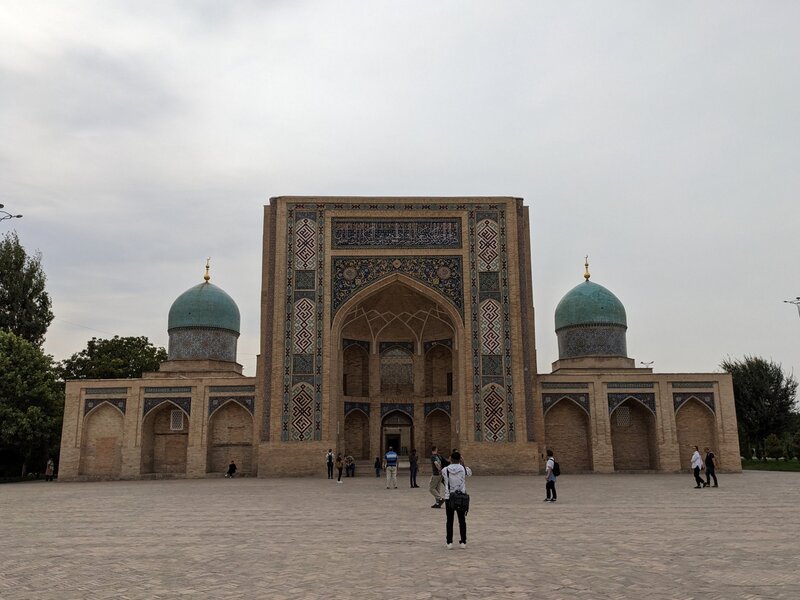
The Islamic architecture of Uzbekistan was still fascinating to this fresh-off-the-boat tourist, at least for now.
It was already three o’clock, and the day looked like it had passed its peak. The traces of sunlight that had seeped through the old windows of Chorsu Bazaar were gone from the gray sky. I wanted to visit nearby villages of Tashkent but it was an awkward time to undertake that trip, because my train to Samarkand was supposed to depart in the evening. I didn’t really know where to go. So I just walked around the neighborhood of the old Tashkent.
But I suddenly knew exactly where I needed to visit. Some time ago, I had seen a picture of this Soviet-era brutalist building called Hotel Uzbekistan and had thought it looked kind of cool. Now that I was in Uzbekistan, the memories of that strange building suddenly came back to me and I wondered whether it was nearby. It would have been really cool to see it with my own eyes. I searched “Hotel Uzbekistan” on the map, and found that the building was indeed in Tashkent. Even better, it was merely a twenty-minute subway ride away. I became excited and started hurrying toward a nearby subway station. On the way, I went into a restroom and I asked the attendant whether he could watch my backpack. Noticing my broken Russian, he said, “Otkuda vy?” (“Where are you from?”) And when I said I was Korean, he replied in Korean that he would look after my backpack. Again caught off guard by a Korean-speaking local, but there was no getting used to that. I took the subway to the central part of Tashkent where Hotel Uzbekistan was located.
When I walked out of the station, the day was getting darker and the sky was even cloudier. I wasn’t sure which direction to walk because the station was huge and had so many exits. So I got out of a random exit and started walking in an unknown direction. That was when I saw the side of an aging concrete building. At first, it was hard to tell what the building was, apart from the fact that it was clearly very old. And as I turned the corner, the impressive facade of the building revealed itself, along with a giant sign that read Hotel Uzbekistan. The sign was mounted on top of the building, in all capitals, in the most basic font possible. It was the quintessence of simplicity, and there was nothing to remove. It was a box-shaped concrete structure with a pattern, completed with a sign that declared what it was. If we removed one part of the sign or one element from the building, it would cease to be what it was supposed to be. Passersby glanced with amusement as I stood in the middle of the sidewalk and looked up at this random building.
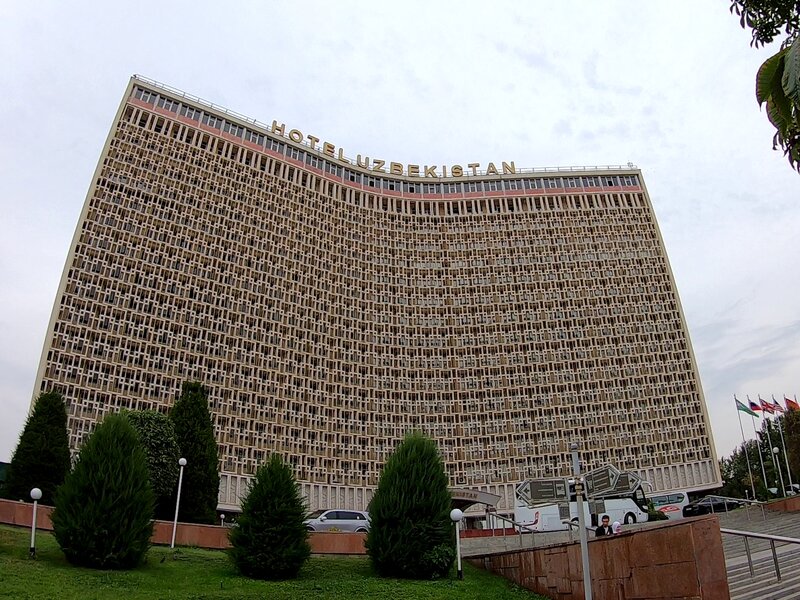
Hotel Uzbekistan was the quintessence of simplicity–if you removed even a single thing, it would cease to be what it was supposed to be.
I was kind of hungry but the area around the Hotel Uzbekistan was pretty upscale and all the restaurants were expensive. So I thought I’d have dinner later near the station at a more affordable place. For the time being, I decided to find a place to sit down and do some planning. I still needed to buy tickets for the rest of my trip toward Azerbaijan–I had only booked the train ticket out of Tashkent that night. I could use a break, too. My shoulders were hurting from carrying the full backpack everywhere since the morning. All I managed to find in the area was a fancy cafe where everyone was typing away on their expensive-looking laptops. I went in and ordered a cup of iced tea which was more expensive than my lunch. But I figured it was probably worth it. The place was pretty quiet and I could focus on planning my next moves.
Sipping the overpriced iced tea, I summarized the current situation. Today was October 13th. I only had enough time to visit Samarkand and Bukhara before the direct flight departed from Tashkent to Baku in three or four days. Given that I was going to be in Samarkand on October 14th, there were several options. The first option was sleeping in Samarkand on October 14th, taking a day trip to Bukhara on October 15th, and coming back to Samarkand that day. Then, I could catch a flight from Samarkand to Baku in the morning of October 16th, arriving in Baku in the afternoon. At first, I liked this idea because this option would take me to all the cities I wanted to visit in the least amount of time.
But something was off about the plan, and I realized what it was. I needed to come back to Tashkent for a day to visit the nearby villages to meet the ethnic Koreans and hear their stories. That was the whole reason I came here–the whole reason I’d been practicing my broken Russian for the past year. It would be wrong to leave Uzbekistan just like that. Coming back to Tashkent would add at least one more day to the trip, but it was the right choice. So I planned to go to Samarkand on October 14th, to Bukhara on October 15th, and to return to Tashkent on a sleeper train on October 16th. Then I could spend the entire day in Tashkent before catching a red-eye flight to Baku at 3:20AM on the following morning of October 17th.
That full day in Tashkent was going to be tough because I wouldn’t have any accommodation, but it was the best way to save time and do what I needed to do. I booked a late night train to come back to Tashkent from Bukhara in two days and also booked a seat on that red-eye flight from Tashkent to Baku. It was such a relief to have a plan finally in place. But there was still a small flaw. I couldn’t find a sleeper train from Samarkand to Bukhara for the evening of October 14th. As always, I wanted to sleep on a train so that I could save on the accommodation, but everything was booked out. I decided to check at Samarkand station in person tomorrow. Maybe something would come up.
I did entertain an idea of staying at Hotel Uzbekistan that night and leaving for Samarkand in the following morning. Not just for a rest–I was prepared to shell out some money for the experience. But the Soviet-era hotel was more popular than I had imagined and had already been booked out. Bummer. Maybe next time, though I didn’t know when that would be. I closed my laptop and walked out of the fancy cafe to head to the subway station. It was already past five o’clock, and I wanted to head to the railway station to get some dinner before my train to Samarkand. I really needed to stop surviving on pieces of bread or instant noodles and get some real food in me more regularly. That kind of eating habit couldn’t be healthy, and I just couldn’t afford to be sick now.
While waiting for the bus, the sun set and dusk fell over Tashkent. I hadn’t noticed the other night, but Tashkent got really cold once the autumn sun went down. I wasn’t really dressed for the weather, and my sore throat and runny nose were getting worse by the minute. I roamed around the neighborhood near the station, trying to find a reasonably clean and, importantly, affordable place to have dinner. Even the cold wasn’t enough to shake my cheap habits, I guess. But what also made me roam the streets was a craving for this Uzbek national dish called Plov, which was supposed to be rice cooked with a bunch of meat and vegetables. I couldn’t find any nearby restaurant that served it. So, in the end, I had two lamb shashliks and a water at a small and empty local joint. It reminded me of breakfast with Sam on that cold morning in Urumqi several days ago. I downed the shashlik in a hurry and went back to the station. It was drizzling outside and the streets were dark. I traced my steps back while repeatedly checking the time.
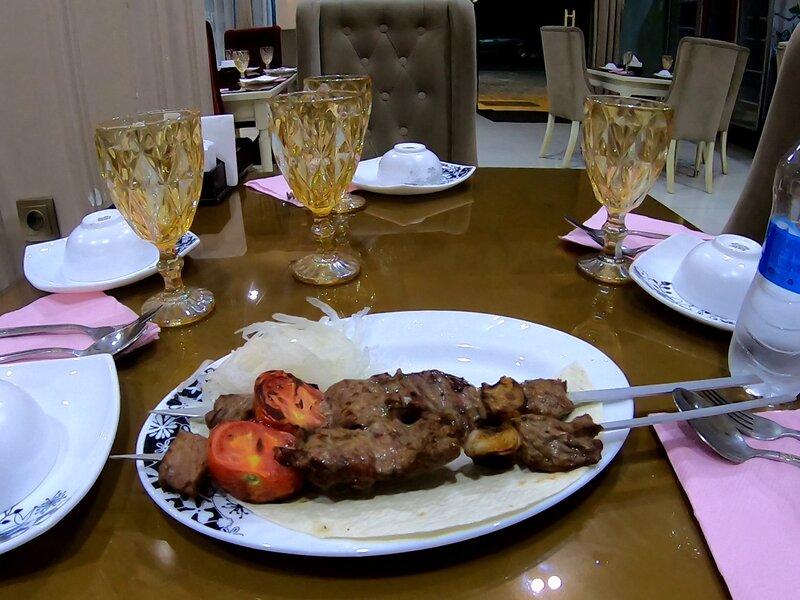
I downed the lamb shashlik before hurrying off to the station. They reminded me of the breakfast with Sam on that cold morning in Urumqi.
At the station, the train was already sitting on the wet platform, the raindrops silently covering it with layers of wetness. Everything smelled like rain–I could smell the moisture of the tracks, the train, and even the bright white lights emanating from the street lamps. To escape the rain, I hurried to my wagon, awkwardly carrying a large bottle of water that I picked up from a kiosk. I walked past all the nice wagons with fancy seats and warm lights and reached the end of the train to find my wagon in its most unassuming appearance. I presented my ticket to the conductor standing near the door and climbed onto the train car. In that car, there were four bunk beds facing each other on one side, and on the other side two seats on the ground and a bunk bed above. I didn’t have a bed, just a seat. As soon as I found my seat and sat down, I realized that it was going to be a long and uncomfortable ride. The seat could barely even fit my backpack. There was a metal beam awkwardly placed right behind my spine, so it was impossible to lean back. And there was no place to put my feet, because next to the seat was an aisle where passengers walked by.
As the departure time approached, the train slowly filled up with passengers. The seats and bunk beds near me were occupied mostly by Uzbek babushkas who were very well prepared for the train ride. They laid out snacks on the tiny tables and pulled out their own blankets from the bags. I sat awkwardly on the tiny seat, totally unprepared for the hours ahead. No snacks. No blankets. No nothing. While I was trying hard to make myself small to make way for the passengers that continued to come through the aisle, a young Uzbek dude sat down next to the adjoining seat divided by a thin wall. His name was Isroil, and we struck up a conversation.
Isroil was a soft-spoken guy who was traveling to his hometown of Termez, a city on the Afghanistan border. He showed me photos of Termez on his phone and suggested that I should visit. I confessed that I might not have the time to visit, that I was going to Samarkand, and that I was actually on my way to Dublin. At first, Isroil didn’t understand the part about heading to Dublin. So I showed my route on a map on my phone. He smiled, finally understanding what I was talking about and said “Udachi” (“Good luck”). We chatted a bit more, until Isroil spotted a free bunk bed across the aisle and jumped on it to claim it as his own. I envied his audacity as my legs already started to fall asleep in the compact space.
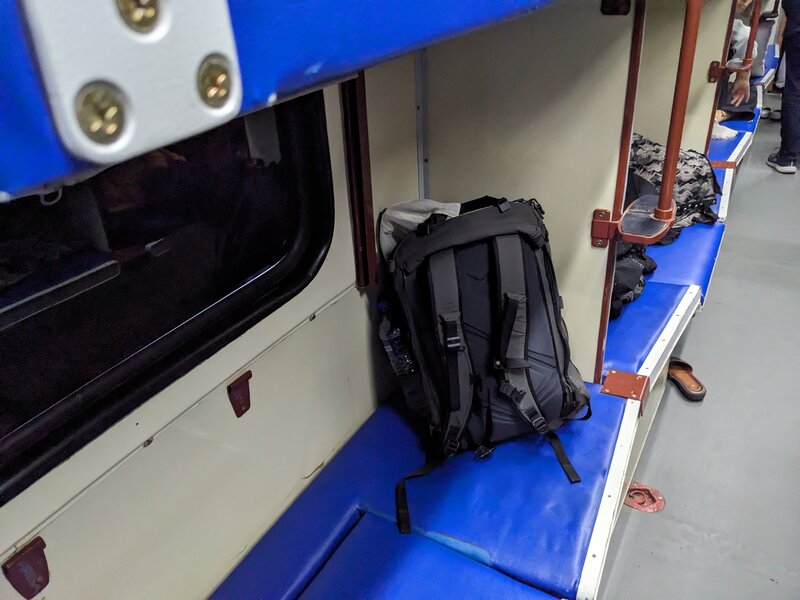
Riding the night train for four hours on that tiny seat was more difficult than I thought.
The train was due to depart in less than ten minutes, and the last of the passengers were boarding. A tall guy with a small suitcase slowly walked along the aisle, carefully looking at the seat numbers. He stopped at the seat next to mine, checked his ticket, and sat down. As we each tried to make ourselves comfortable in the tiny space that we were allotted, the wheels of the train made a loud squeaky noise, as it jolted the train into motion on the wet track.
My fellow passenger and I started talking. His name was Kostya, a Bulgarian man who was living in Turkey. He spoke Russian because he had studied in Russia for many years. He was also traveling by himself. “A pochemu vy v Uzbekistane?” I asked Kostya (“So, why did you decide to visit Uzbekistan?”), excited to meet another traveler. “Nu, prosto tak” (“Well, just because”), he replied, “Zdes’ krasivo, pochemu nyet?” (“It’s beautiful here. So why not”)
The conversation of two travelers naturally flowed into where we had been and where we were headed. I told Kostya that I would be rushing through Samarkand, Bukhara, Baku, and that I was trying to get to Dublin. Kostya listened with interest. At this point, we discovered that we both spoke English, so we switched to it. “Wow, but,” Kostya said, “One day in Samarkand? One day in Baku? I think that’s too short. You will need a couple of days to see Baku.” I couldn’t argue with that, even when unfettered from my broken Russian. “Yeah, I know,” I replied, “Guess I’ll just have to make the most of it.”
As the train sped through the monotonous darkness outside, eventually our conversation died down. “I hope it will pass soon,” Kostya said, trying to make himself comfortable in the tiny seat, “I mean, it’s only four hours.” That was what I thought, but spending four hours on that tiny seat was harder than I’d expected. Two hours into the train ride, both Kostya and I were practically squirming out of boredom and discomfort. We both took off our shoes and put our feet in that tiny space between our seats. I hugged my knees and buried my face in my arms. I could feel the cold air from outside slipping through the loose seal of the windows. I curled up my body even further to keep myself warm. When I looked across the aisle, Isroil was already asleep with his bare feet sticking out of the bed. There was nothing to see outside the train window. Apart from the darkness, all I could see were reflections of the cabin, and thin streaks that raindrops left behind as they tapped the window without a sound.